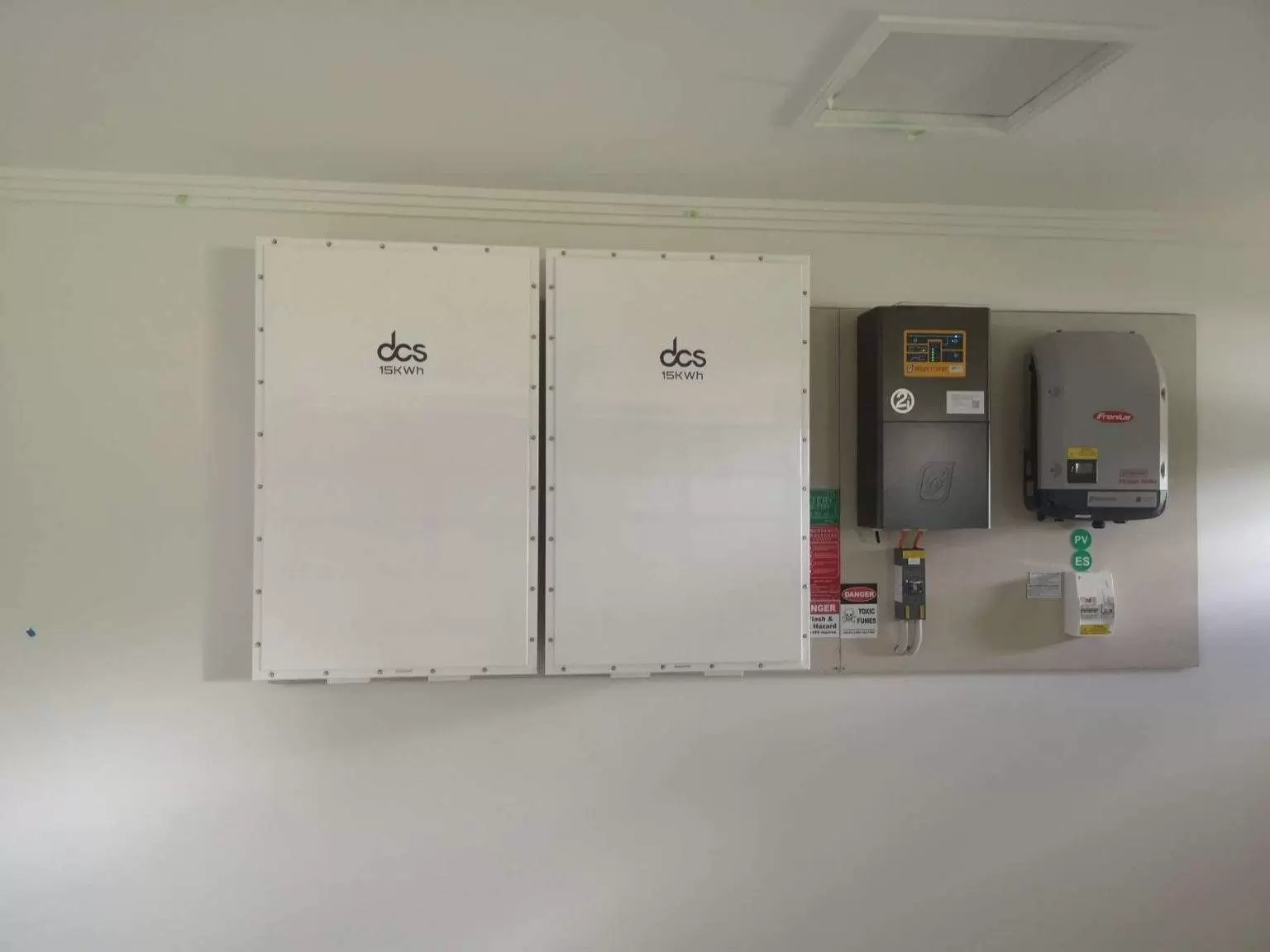With the surge in demand for sustainable energy, PV Panel Battery has become essential for harnessing and storing solar power. These batteries capture the electricity generated by photovoltaic panels, enabling users to access power even during periods without sunlight. The use of PV panel batteries is growing among homeowners and businesses due to their ability to provide a consistent power supply and enhance energy efficiency. Users can better manage their energy needs and contribute to a greener environment by understanding how these batteries function within a solar energy system.
The Functioning of PV Panel Batteries
PV panel batteries work by storing the electricity produced by photovoltaic panels. The panels Initially convert sunlight into direct current (DC) electricity. Since household appliances generally use alternating current (AC), an inverter must change the DC into AC. The battery stores the converted electricity, ensuring it is available when needed, such as during cloudy days or at night. This storage capability helps maintain a steady power supply regardless of solar production conditions. The inverter and battery are crucial in managing energy flow, allowing for a balanced and efficient solar energy system.
Varieties of Solar Batteries
Solar batteries come in several types, each with its own set of advantages and disadvantages. Lead-acid batteries are the oldest and most affordable but require regular maintenance. Lithium-ion batteries, while more expensive, offer a longer lifespan and higher efficiency. Saltwater batteries are an emerging technology that promises environmental benefits, though they are still relatively new. Choosing the right type depends on individual needs and preferences. Each battery type varies in cost, lifespan, efficiency, and maintenance requirements. Understanding these differences is essential for selecting the most suitable battery for energy storage.
The Benefits of Utilising PV Panel Batteries
Using photovoltaic (PV) panel batteries offers a smart way to manage solar energy by storing surplus power generated during peak sunlight hours. This stored energy can be used when solar production is low or during nighttime, reducing the need to rely on the grid. Homeowners and businesses benefit from this efficient energy management, reducing electricity costs.
Significant Savings for Homeowners and Businesses
For homeowners, PV panel batteries can significantly reduce energy bills by providing an alternative to grid-supplied electricity. By storing excess solar energy, homeowners can use it during periods of high demand, such as in the evening when electricity prices are higher. Businesses also see similar advantages, as reduced grid dependence translates into lower operational costs, increasing overall energy efficiency.
Enhancing Resilience and Promoting Energy Independence
Another critical benefit of PV panel batteries is their ability to enhance resilience during power outages. With a backup power source, users are better prepared for unexpected interruptions, ensuring continuous energy supply even during grid failures. This feature promotes energy independence, reducing reliance on external energy sources and improving overall system reliability.
Contributing to a Sustainable Future
PV panel batteries also play a vital role in sustainability efforts. By decreasing dependence on fossil fuels and enhancing renewable energy use, these batteries contribute to a cleaner, more sustainable environment. The ability to store solar energy and use it when needed helps to promote energy independence, reduce carbon footprints, and encourage long-term sustainability.
Off-Grid Battery Systems Explained
Off-grid battery systems are designed for properties that generate and store their energy, making them ideal for remote locations. Unlike grid-tied systems, off-grid setups operate independently from the national grid, providing complete autonomy over energy consumption. These systems often combine PV panel batteries with renewable energy sources like wind turbines to ensure a consistent power supply.
Essential components include solar panels, an inverter, and a battery storage unit. The system must be adequately sized to meet the energy demands of the property, taking into account factors such as daily energy usage and seasonal variations in sunlight. Proper planning and installation are crucial to ensure reliability and efficiency.
Additionally, off-grid systems often include a backup generator to provide power during prolonged periods of low solar production. Overall, these systems offer a sustainable and self-sufficient energy solution for locations without reliable access to the grid.
Selecting the Appropriate Off Grid Battery System
Choosing a suitable Off Grid Battery System requires careful consideration of several factors. Capacity, measured in kilowatt-hours (kWh), is critical as it indicates how much energy the battery can store. Evaluate your household or business’s energy usage to ensure the battery can meet your demands.
Additionally, please consider the battery’s lifespan and efficiency, which will affect its performance and cost-effectiveness over time. It’s also important to consider the battery’s price and whether it fits within your budget. Finally, compatibility with your existing PV system and ease of installation are crucial factors to ensure seamless integration and optimal performance.
Installing PV Panel Batteries
Installing PV panel batteries requires meticulous attention to detail. First, ensure the chosen location is shielded from extreme temperatures and moisture to protect the battery. The installation includes securely mounting the battery and connecting it to the inverter. This integration must be seamless to maintain the system’s efficiency. Safety is paramount, so adhering to electrical codes and standards is essential.
Given the complexity of the task, it is often advisable to seek professional help. Professionals can ensure all connections are secure and that the system complies with safety regulations. Proper installation not only guarantees optimal performance but also prolongs the lifespan of the battery.
Maintaining Solar Batteries
Proper maintenance ensures the longevity and performance of solar batteries. Regular inspections should be conducted to monitor the battery’s state of charge and functionality. Clean terminals to prevent corrosion, look for signs of wear or damage and address any issues promptly. It’s essential to keep the battery area clean and free from debris. Follow the manufacturer’s guidelines for usage and storage conditions, as adhering to these recommendations can prevent efficiency loss.
Regular software updates for battery management systems may also be necessary to optimise performance. Ensuring proper ventilation around the battery can help prevent overheating.
Financial Considerations for Purchasing a Solar Battery Pack
When purchasing a solar battery pack, it’s essential to consider both the initial investment and the long-term financial benefits. While the upfront cost can be substantial, many financial incentives and subsidies are available to help offset this expense. Additionally, the savings on energy bills over time can make the investment worthwhile.
Assessing the cost-effectiveness of different battery types, such as lead-acid, lithium-ion, and saltwater batteries, is crucial. Each type has its price range, lifespan, and efficiency, affecting the overall financial outlay. Comparing these factors can help determine the most economical option for your energy needs.
Environmental Impact Assessment
PV panel batteries play a crucial role in promoting environmentally friendly energy solutions. By storing excess solar energy, these batteries ensure that solar power is utilised efficiently, thereby reducing the need for electricity generated from fossil fuels. This reduction in fossil fuel use translates to fewer greenhouse gas emissions, significantly contributing to climate change.
Moreover, using solar batteries supports adopting renewable energy sources, encouraging a shift towards more sustainable energy systems. The environmental benefits extend beyond emission reductions; the production and disposal of solar batteries are also becoming more eco-friendly.
Manufacturers increasingly focus on creating batteries with recyclable materials and longer lifespans to minimise environmental impact. By investing in solar batteries, individuals and businesses can actively participate in global efforts to combat climate change and protect the environment for future generations. Additionally, innovations in battery technology continue to improve the sustainability of these energy storage solutions, making them an even more attractive option for environmentally conscious consumers.
The Future of Solar Energy Storage
The future of solar energy storage is characterised by rapid technological progress, which promises to enhance the efficiency and capacity of storage systems. Innovations such as solid-state batteries and improvements in energy density are expected to transform the industry, making solar energy more accessible and practical for widespread use. These advancements could lead to batteries that are more cost-effective and capable of storing more significant amounts of energy in smaller, more compact units.
Additionally, new materials and manufacturing techniques are likely to reduce production costs and increase the lifespan of solar batteries. Another development area is integrating innovative technology, allowing for better energy management and optimisation. With these improvements, solar batteries are set to become even more integral to renewable energy systems, supporting the shift towards more sustainable and efficient power solutions.
Debunking Common Misconceptions
Several misconceptions surrounding solar batteries can deter potential users.
- One common myth is that solar batteries are prohibitively expensive for the average consumer. While the initial cost can be high, the long-term savings and available financial incentives often make the investment worthwhile.
- Another widespread belief is that solar batteries cannot store sufficient energy to meet daily needs. In truth, advancements in battery technology have significantly increased storage capacities, making them a viable option for most households and businesses.
- Some people think solar batteries are only helpful in sunny climates. However, modern solar batteries can store energy efficiently even in regions with less sunlight, ensuring a consistent power supply.
- Another misconception is that solar batteries require frequent maintenance. While regular checks are necessary to ensure optimal performance, many modern batteries are designed to be low maintenance.
- There is also a notion that integrating a solar battery into an existing PV system is overly complicated. On the contrary, many batteries are designed for seamless integration and come with comprehensive installation guides. For those concerned about the environmental impact of producing and disposing of solar batteries, it’s important to note that manufacturers are increasingly using recyclable materials and improving battery lifespan to minimise ecological harm.
- Lastly, solar batteries could be more reliable and provide a stable power supply. Modern systems are designed with advanced technology to ensure reliability, and many come with warranties that guarantee performance.
By understanding the reality of solar batteries, individuals can make more informed decisions about adopting this sustainable energy solution.
Conclusion
Incorporating PV Panel Battery into your solar energy system offers a range of benefits, from reducing reliance on the grid to contributing to a more sustainable future. These batteries not only help store excess solar power for later use, but also improve energy efficiency, reduce electricity costs, and enhance resilience during power outages. With various battery types available, it is important to carefully consider your energy needs, budget, and environmental preferences when selecting the right battery for your system. As technology continues to evolve, the future of solar energy storage is bright, offering more accessible, cost-effective, and sustainable solutions for homeowners and businesses alike.
FAQ’s
1. What types of solar batteries are available?
There are several types of solar batteries, each with its own pros and cons. The most common types are lead-acid, lithium-ion, and saltwater batteries. Lead-acid batteries are the most affordable, but require regular maintenance. Lithium-ion batteries offer a longer lifespan and higher efficiency but come at a higher cost. Saltwater batteries are an emerging technology that promises environmental benefits, though they are still relatively new to the market. The right type of battery depends on your energy needs, budget, and maintenance preferences.
2. How long does PV Panel Battery last?
The lifespan of a PV Panel Battery varies depending on the type of battery and how well it is maintained. Typically, lead-acid batteries last between 3-5 years, while lithium-ion batteries can last up to 10-15 years. Saltwater batteries, being a newer technology, are expected to have a lifespan of 5-10 years. The longevity of any battery depends on its usage, maintenance, and environmental conditions. Regular checks and proper maintenance can help maximize the lifespan of your solar battery.
3. How do solar batteries work in off-grid systems?
In off-grid systems, solar batteries store the energy produced by photovoltaic panels, providing power during times when sunlight is not available. These systems operate independently from the national grid, making them ideal for remote locations. Off-grid systems typically combine solar batteries with other renewable energy sources, such as wind turbines, to ensure a consistent power supply. Batteries need to be properly sized to meet the energy demands of the property, taking into account factors like daily usage and seasonal variations in sunlight.
4. Are there any incentives or rebates for purchasing solar batteries?
Yes, many governments offer incentives, rebates, and tax credits to encourage the adoption of renewable energy solutions, including solar batteries. These incentives can help reduce the initial cost of purchasing and installing a solar battery. It’s important to check with local utility providers and government agencies to understand the available incentives in your region. Additionally, some manufacturers offer financing options, making solar energy storage more affordable for homeowners and businesses.
5. Can solar batteries be installed with an existing solar system?
Yes, many solar batteries are designed to be easily integrated into existing photovoltaic (PV) systems. When selecting a solar battery, it is important to check its compatibility with your current system. Most modern solar batteries come with user-friendly installation guides and can be installed by professionals or in some cases, as a DIY project. Integrating a battery into an existing system allows you to store excess solar power and improve energy efficiency without the need for a completely new setup.




